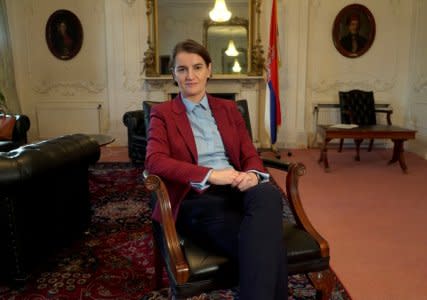Serbian PM threatens to resign over colleagues' 'personal vanities': state media

Thomson Reuters
BELGRADE (Reuters) - Serbian Prime Minister Ana Brnabic said she may resign from the coalition government if "personal vanities" were not put aside, accusing her colleagues of failing to work as a team, a state-run news agency reported on Tuesday.
Brnabic expects to discuss the possibilities of a cabinet reshuffle or resignation with President Aleksandar Vucic when he returns from Brussels later this week, Tanjug news agency quoted her as saying.
Critics say Brnabic, who is not affiliated to any party, has little leverage within a cabinet in which most ministers come from Vucic’s Progressive Party (SNS) and the Socialist Party of Serbia (SPS).
"We will either function as a team without personal vanities and promoting of personal agendas and we will have results or I do not have to be the Prime Minister," Brnabic said according to Tanjug, without giving further details.
Brnabic's office was not immediately available for comment.
Opposition deputies said Brnabic, who is not affiliated with any party, was unlikely to have any real leverage in her cabinet after Vucic nominated her in June to become Serbia's first female and openly gay prime minister.
If Brnabic resigns, Vucic would have to nominate her replacement from the ranks of the ruling coalition or call a snap election.
After his landslide victory in the April 2017 presidential vote, Vucic nominated Brnabic to become Serbia's first female and openly gay prime minister, but opposition politicians said at the time that she would likely have little clout in government.
Serbia, the largest of the states to emerge from the former Yugoslavia in the 1990s, is performing a delicate balancing act between its European Union membership aspirations and a popular affinity for Russia, its huge Orthodox Christian and Slavic ally.
Upon taking office last year, Brnabic said she would make joining the EU a priority.
Accession could tentatively happen in 2025 but Serbia must before then reform its economy, judiciary, role of law and environmental policies.
It also needs to resolve outstanding issues with its former province Kosovo, which declared independence in 2008. The EU-sponsored dialogue between the countries has been resolved this week after two months.
(Reporting by Aleksandar Vasovic; Editing by Raissa Kasolowsky)
See Also:

 Yahoo News
Yahoo News 
